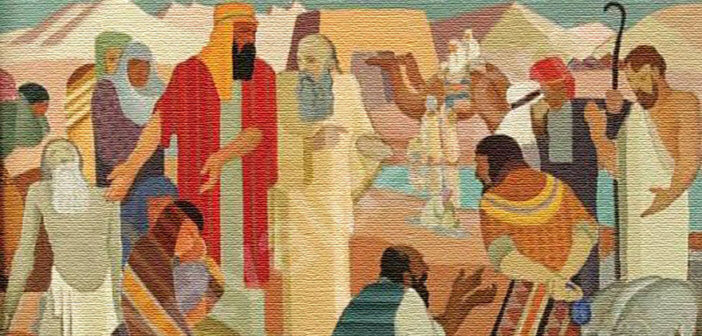Lewis Center Director Doug Powe says when looking for leadership lessons in the Bible we shouldn’t focus so much on Moses that we skip over his father-in-law Jethro. In Exodus 18, Jethro offered important insights that transformed Moses’ practice of leadership and can help us as well.
While Jethro is not as prominent a character in Exodus as Moses, he is an important figure because of his wise counsel. In Exodus 18, Jethro provides leadership insights that are still relevant for all of us today. I believe we all can benefit from his leadership advice and the way in which Moses receives it. Let me share five insights present in the dialogue between Jethro and Moses in Exodus 18 — insights that transform Moses’ practice of leadership.
1. It’s not about you.
Moses became the center of attention in the Israelite camp hearing all the cases and problems of the people from morning to evening. Jethro observed this taking place and asked Moses, “What are you doing?” In other words, he was asking, “Why are you making yourself the center around which everything has to revolve?” Moses’ response (my paraphrase) is typical for many of us who are leaders. “The people expect me to have all of the answers!”
Jethro holds no punches. He tells Moses this is not a good thing. You cannot lead in a manner where it’s all about you. We do not know, but my guess is Moses did not intend to make it all about himself. Many of us who fall into the same trap do not set out to make it all about ourselves either. But when we end up in that place, the reality is we are going to wear ourselves out and do the community we serve a disservice. Leadership should never be all about one person. What happens when that person is gone? Jethro’s advice to Moses is to quit making it all about yourself.
2. Instruct the people.
Jethro tells Moses to communicate to the people, to “teach them the statutes and instructions and make known to them the way they are to go and the things they are to do.” (Exodus 18:20) I believe Jethro is telling him to help the people understand the vision so they can picture where they are headed and what is needed to get there. Perhaps I am reading into the text. But stick with me. Jethro is suggesting that Moses instruct the people as a whole so that they understand God’s expectations. It seems that Moses was waiting for a problem to arise before sharing insights from God. Jethro is saying do not wait until something happens. Do it up front.
We need to help people see where we are headed and how we are going to get there. It will make them more comfortable because we are communicating the vision. A lot of times individuals ask questions because they are uncertain of where we are going and what is expected. The more we can instruct individuals up front the better. Instruct the entire community so that all can hear the vision.
3. Build a team.
Jethro makes it clear to Moses that, if it is not all about him, he must build a team. Jethro suggests that Moses mentor leaders who can share in the responsibility of leading. In fact, he suggests that the team must not only help Moses, but also mentor others to be leaders. Jethro understands the importance of developing a leadership team and knows the best way to do this is to create a leadership pipeline — a process of being mentored and mentoring at the same time. Building a strong team not only helps to address current needs, but also sets the stage for a strong future.
4. Trust the team.
Jethro makes it clear that it is not enough just to build the team. Moses must give them appropriate responsibility. Jethro suggests that the team hear the issues first and resolve those that are less complicated, allowing Moses to focus on the critical issues and not to wear himself out.
When we build a team, we must trust the team to do the work. It is finding the right balance of being involved but not so involved that individuals feel disempowered. If we choose the right people for the team, then we need to trust them to do the work. Like Moses, we will discover that it will make our lives easier.
5. Listen to good advice.
One of the key lines of the text is, “Moses listened to his father-in-law.” (Exodus 18:24) Although what Moses was doing was working, he still listened to his father-in-law because there was room for improvement. It is important for leaders to listen to others. This is especially true when it seems like everything is going well and we do not need advice.
We are prone to listen most attentively when things are not going well. The challenge is to listen even when we think we have it right. Listening does not automatically mean changing course, but it can make us aware that we need to be mindful if what is ahead. We must learn to listen in good and challenging times.
Jethro is not highlighted as often as Moses. But we can learn valuable leadership insights from him that can transform the way we lead in our settings.
Related Resources
- Leading as Moses Led by Emanuel Cleaver III
- Ten Leadership Lessons from Nehemiah by Lovett H. Weems, Jr.
- “Biblical Leadership,” a Leading Ideas Talks podcast episode featuring Denise Dombkowski Hopkins
If you would like to share this article in your newsletter or other publication, please review our reprint guidelines.







